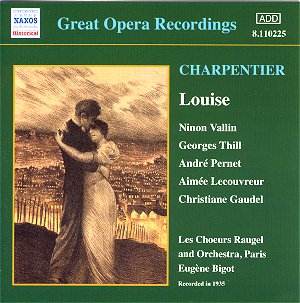Abridgement
was still very much the name of the game for operatic sets during
the 78 era. In the whole of that time the only Wagner opera to
approach a degree of completeness was the Elmendorff Tristan –
and that was pretty much shorn of the majority of the Third Act.
So it was with Charpentier’s Louise, of which a goodly number
of single-sided Depuis le jour have of course survived.
This set captures just short of seventy minutes and was nevertheless
something of a coup for French Columbia because they managed to
enlist the services of the composer himself who oversaw its production
(as he was later to do with the 1938 film which starred two of
the cast members here, Thill and Pernet; Grace Moore starred instead
of Ninon Vallin).
The
cast was a strong one, the conductor an authoritative exponent
of the French repertoire and the musical selection – although
less than half of the score - apposite. Furthermore the recording
was good for its day, studio based, with reasonable balance between
singers and orchestra. The off-stage crowd scenes were well managed
and the spatial considerations were intelligently met. I didn’t
hear the Nimbus version of this – NI 7829, which I suppose would
take some tracking down – so this Naxos release is now the only
transfer of this 1935 set in the current catalogue. Ward Marston
has used a degree of reverberation and its attractiveness is a
matter for the listener to decide. It softens the degree of acoustical
deadness in the Parisian studio but I can’t say the original discs
ever caused me huge problems in this respect. My own instincts
are perhaps against this degree of – however sensitively applied
– intervention but I’m sure others will appreciate the bloom imparted
to the voices.
Vallin
was over fifty at the time of the recording; you’d never know
it. She was a famous Louise and her emotive range is considerable,
whether in passionate declamation or coquettish insinuation. She
remained in good technical form, her breath control being something
of a marvel, and she rolled her "r" in characteristically
Parisian fashion with a degree of insouciant command. There was
something of a mezzo quality to her lower register, which gave
her vocal mobility but the abiding impression is one of style
and charm supported by knowing characterisation. It’s something
of a mystery therefore why, in her most famous moment here, Depuis
le jour, she makes such a relatively disappointing
impression. In Thill she had a famously masculine dramatic tenor
and one who continues to divide critical opinion whenever his
name is mentioned. One of his standout moments here is the guitar
accompanied Serenade from Act II Scene II which he sings with
affectionate lyric intensity. The Father was Pernet and he takes
us from bluffly sympathetic to coarsely dismissive through excellent
husbandry of vocal reserves and a finely etched impersonation.
At first I thought him rather too bluff but I revised my view
rapidly in the light of his subsequent portrayal. The wife is
Aimée Lecouvreur, a believably quarrelsome and meddlesome
figure with mezzo darkness to her voice. And the Irma is Christiane
Gaudel who really scores in the Tableau 2 scene in the Second
Act where she and the other girls tease Louise with a degree of
authentic cattiness.
Bigot
directs splendidly. The orchestra doesn’t always play with any
great degree of refinement but they can rise to peaks of expressivity
when necessary – listen to the strings in Elle va (track
4 – Scenes IV and V in Act Two) where they are luscious. The brass
comes to the fore in the crowd scenes (the Coronation) where they
blend well with the chorus and the other orchestral sections.
We
finish with an appendix - La voix de la nuit from Julien
sung by tenor Maurice Dutreix in October 1913. This was the sequel
to Louise, which starred Caruso and Farrar when it opened
at the Met – but gradually lost ground and pretty much disappeared
from the repertory. It brings the disc up to above the 70-minute
mark and is good company for such an estimably cast and impressively
compiled Louise.
Jonathan
Woolf
See
also review by Robert
Hugill
